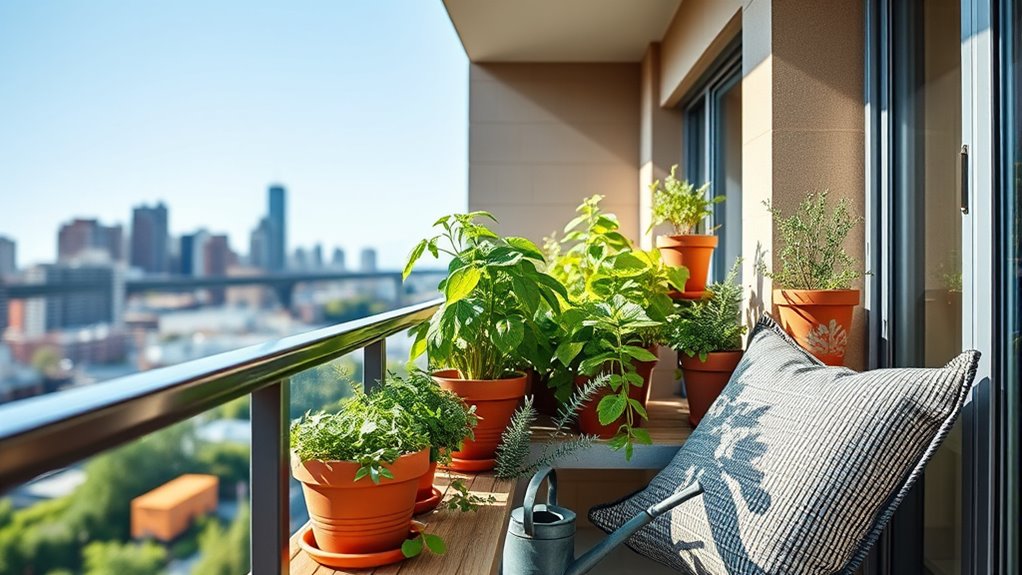To build a balcony herb garden, choose containers with drainage holes suited to your herbs’ size, and place them where they’ll get 4-6 hours of direct sunlight each day. Water regularly but avoid overwatering—keep the soil moist but not waterlogged—and monitor for pests. Keep the area tidy and adjust your garden as seasons change for the best results. Continue exploring these tips to create a lush, thriving balcony oasis.
Key Takeaways
- Choose containers with drainage holes suited for different herbs’ sizes and growth needs.
- Place containers where they receive 4-6 hours of direct sunlight daily for optimal growth.
- Water herbs consistently, keeping soil moist but not waterlogged, and monitor soil moisture regularly.
- Ensure proper drainage to prevent overwatering and root rot, avoiding standing water in saucers.
- Regularly inspect for pests, remove dead leaves, and maintain cleanliness to promote healthy, pest-free herbs.

Creating a balcony herb garden is a rewarding way to enjoy fresh flavors right outside your door. To start, choose the right containers that provide good drainage and ample space for your herbs to grow. Small pots are perfect for herbs like basil, cilantro, and parsley, but larger containers work well for plants like rosemary or mint, which can spread quickly. When setting up your garden, consider the sunlight your balcony receives daily. Most herbs thrive with at least 4-6 hours of direct sunlight, so position your containers accordingly.
Once your herbs are planted, watering becomes a key part of maintaining a healthy garden. You want to keep the soil consistently moist but not waterlogged. A good rule of thumb is to check the top inch of soil daily; if it feels dry, it’s time to water. Use a watering can or a gentle spray to avoid displacing soil or damaging delicate leaves. During hot or windy days, you might need to water more frequently, especially for herbs like basil and cilantro that prefer moist conditions. Overwatering can lead to root rot, so ascertain your containers have drainage holes and don’t let excess water sit in saucers under the pots.
Pest control is another vital aspect of herb gardening on a balcony. The good news is that balcony gardens tend to have fewer pests than ground gardens, but you should still stay vigilant. Regularly inspect your herbs for signs of pests such as aphids, whiteflies, or spider mites. If you notice pests, start with natural remedies like spraying your herbs with a mixture of water and a few drops of dish soap or applying neem oil. These methods are effective without harming beneficial insects or the environment. Keep your garden clean by removing dead leaves or debris, which can attract pests. Also, avoid overwatering, as overly moist conditions can promote fungal issues and pest infestations.
Frequently Asked Questions
What Are the Best Herbs for Small Balcony Spaces?
For small balcony spaces, you want herbs that thrive in limited areas and benefit from companion planting. Choose compact herbs like basil, thyme, and chives, which are perfect for container choices. These herbs grow well together, enhancing flavor and health. Use vertical or hanging containers to maximize space. Select sturdy, drainable containers, and arrange them to get ample sunlight—your small balcony can produce a lush, flavorful herb garden with these tips.
How Do I Protect Herbs From Balcony Wind Damage?
To protect your herbs from balcony wind damage, you should set up wind barriers like tall plants, lattice screens, or lightweight fences to block gusts. Using protective covers, such as cloches or row covers, also helps shield herbs from strong winds and temperature drops. Position these barriers strategically around your herbs, and secure covers properly to prevent them from blowing away, ensuring your plants stay healthy and undamaged.
Can I Grow Herbs Indoors on My Balcony?
Yes, you can grow herbs indoors on your balcony. Make sure to provide adequate indoor lighting, like a south-facing window or grow lights, so your herbs thrive. Choose the right herb container selection—draining pots with quality soil helps prevent overwatering. Keep herbs away from direct wind and drafts, and monitor moisture levels regularly. With proper lighting and containers, your indoor balcony herbs will flourish.
What Watering Schedule Is Ideal for Balcony Herbs?
You should water your balcony herbs when the soil moisture feels dry to the touch, usually every 2-3 days. Adjust watering frequency based on weather conditions—hot days need more frequent watering, while cooler days require less. Keep an eye on soil moisture levels, ensuring they’re consistently moist but not waterlogged. Proper watering helps your herbs thrive, preventing both drought stress and root rot.
How Do I Prevent Pests in My Balcony Herb Garden?
You might think pests are inevitable, but you can prevent them effectively. Start by using companion planting, which naturally repels pests and attracts beneficial insects. Incorporate natural repellents like neem oil or garlic spray regularly. These methods reduce the need for chemicals, keeping your herbs healthy and safe. Consistent use of companion planting and natural repellents creates a protective barrier, so pests stay away from your balcony herb garden.
Conclusion
Now that you’ve set the stage for your balcony herb garden, you’ve opened the door to a world of fragrant delights and fresh flavors. With a little care and patience, your small green sanctuary will flourish, quietly transforming your space into a lush, aromatic retreat. Remember, every leaf and blossom is a gentle reminder that even the simplest efforts can nurture something truly special. So go ahead—tend to your garden, and let its subtle charm inspire you daily.









